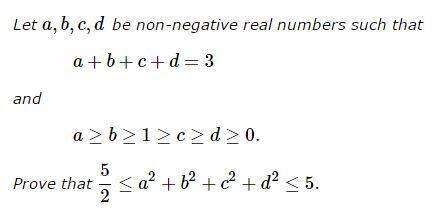From Six Variables to Four - It's All the Same
Problem

Solution
Let $\displaystyle P=\sum_{all}a^2.\,$ By the Cauchy-Schwarz inequality,
$\displaystyle a^2+b^2\ge\frac{1}{2}(a+b)^2=\frac{t^2}{2},\;\text{with}\,2\le t\le 3,\\ \displaystyle c^2+d^2\ge\frac{1}{2}(c+d)^2=\frac{(3-t)^2}{2}\\ \displaystyle P\ge\frac{t^2+(4-t)^2}{2}=\frac{\displaystyle 2\left(t-\frac{3}{2}\right)^2+\frac{9}{2}}{2}\ge\frac{5}{2},\;\text{for}\, 2\le t\le 3.$
It follows that $\min P\displaystyle =\frac{5}{2},\,$ where $a=b=1,\,$ $\displaystyle c=d=\frac{1}{2}.$
Further,
(*)
$P =(a+b)^2-2ab+(c+d)^2-2cd\le t^2+(3-t)^2-2ab.$
Since $a,b\ge 1,\,$ we also have $(a-1)(b-1)\ge 0,$
implying,
(**)
$ab\ge a+b-1.$
From (*) and (**) it follows that
$\begin{align} P&\le (3-t)^2+t^2-2t+2=2t^2-8t+11\\ &=2(t-2)^2+3\le 5,\;\text{for}\, 2\le t\le 3. \end{align}$
Thus, $\max P=5,\,$ where $t=3,\,$ i.e., $a=2,\,$ $b=1,\,$ $c=d=0.$
Acknowledgment
I am grateful to Leo Giugiuc who has kindly posted the problem of his at the CutTheKnotMath facebook page. He later posted a similar problem with six variables. The above is an application of Richdad Phuc's solution of that problem to the current, simpler one. Worked like a charm.
Inequalities with the Sum of Variables as a Constraint
- An Inequality for Grade 8 $\left(\displaystyle\frac{1-x_1}{1+x_1}\cdot\frac{1-x_2}{1+x_2}\cdot\ldots\cdot\frac{1-x_n}{1+x_n}\ge\frac{1}{3}\right)$
- An Inequality with Constraint $((x+1)(y+1)(z+1)\ge 4xyz)$
- An Inequality with Constraints II $\left(\displaystyle abc+\frac{2}{ab+bc+ca}=p+\frac{2}{q}\ge q-2+\frac{2}{q}\right)$
- An Inequality with Constraint V $\left(\displaystyle\prod_{k=1}^{n}x_k^{1/x_k}\le \frac{1}{n^{n^2}}\right)$
- An Inequality with Constraint VI $\left(\displaystyle\prod_{k=1}^{n}\frac{1+x_k}{x_k}\ge \prod_{k=1}^{n}\frac{n-x_k}{1-x_k}\right)$
- An Inequality with Constraint XI $(\sqrt{5a+4}+\sqrt{5b+4}+\sqrt{5c+4} \ge 7)$
- Monthly Problem 11199 $\left(\displaystyle\frac{1}{a}+\frac{1}{b}+\frac{1}{c}\ge\frac{25}{1+48abc}\right)$
- Problem 11804 from the AMM $(10|x^3 + y^3 + z^3 - 1| \le 9|x^5 + y^5 + z^5 - 1|)$
- Sladjan Stankovik's Inequality With Constraint $\left(abc+bcd+cda+dab-abcd\le\displaystyle \frac{27}{16}\right)$
- Sladjan Stankovik's Inequality With Constraint II $(a^4+b^4+c^4+d^2+4abcd\ge 8)$
- An Inequality with Constraint V $\left(\displaystyle\prod_{k=1}^{n}x_k^{1/x_k}\le \frac{1}{n^{n^2}}\right)$
- An Inequality with Constraint VI $\left(\displaystyle\prod_{k=1}^{n}\frac{1+x_k}{x_k}\ge \prod_{k=1}^{n}\frac{n-x_k}{1-x_k}\right)$
- An Inequality with Constraint XII $(abcd\ge ab+bc+cd+da+ac+bd-5)$
- An Inequality with Constraint XIII $((3a-bc)(3b-ca)(3c-ab)\le 8a^2b^2c^2)$
- Inequalities with Constraint XV and XVI $\left(\displaystyle\frac{a^2}{\sqrt{b^2+4}}+\frac{b^2}{\sqrt{c^2+4}}+\frac{c^2}{\sqrt{a^2+4}}\gt\frac{3}{5}\right)$ and $\left(\displaystyle\frac{a^2}{\sqrt{b^4+4}}+\frac{b^2}{\sqrt{c^4+4}}+\frac{c^2}{\sqrt{a^4+4}}\gt\frac{3}{5}\right)$
- An Inequality with Constraint XVII $(a^3+b^3+c^3\ge 0)$
- An Inequality with Constraint in Four Variables $\left(\displaystyle\frac{a^3}{b+c}+\frac{b^3}{c+d}+\frac{c^3}{d+a}+\frac{d^3}{a+b}\ge\frac{1}{8}\right)$
- An Inequality with Constraint in Four Variables II $(a^3+b^3+c^3+d^3 + 6abcd \ge 10)$
- An Inequality with Constraint in Four Variables III $\left(\displaystyle\small{abcd+\frac{15}{2(ab+ac+ad+bc+bd+cd)}\ge\frac{9}{a^2+b^2+c^2+d^2}}\right)$
- An Inequality with Constraint in Four Variables IV $\left(\displaystyle 27+3(abc+bcd+cda+dab)\ge\sum_{cycl}a^3+54\sqrt{abcd}\right)$
- Inequality with Constraint from Dan Sitaru's Math Phenomenon $\left(\displaystyle b+2a+20\ge 2\sum_{cycl}\frac{a^2+ab+b^2}{a+b}\ge b+2c+20\right)$
- An Inequality with a Parameter and a Constraint $\left(\displaystyle a^4+b^4+c^4+\lambda abc\le\frac{\lambda +1}{27}\right)$
- Cyclic Inequality with Square Roots And Absolute Values $\left(\displaystyle \prod_{cycl}\left(\sqrt{a-a^2}+\frac{1}{2\sqrt{2}}|3a-1|\right)\ge\frac{1}{6\sqrt{6}}\prod_{cycl}\left(\sqrt{a}+\frac{1}{\sqrt{3}}\right)\right)$
- From Six Variables to Four - It's All the Same $\left(\displaystyle \frac{5}{2}\le a^2+b^2+c^2+d^2\le 5\right)$
- Michael Rozenberg's Inequality in Three Variables with Constraints $\left(\displaystyle 4\sum_{cycl}ab(a^2+b^2)\ge\sum_{cycl}a^4+5\sum_{cycl}a^2b^2+2abc\sum_{cycl}a\right)$
- Michael Rozenberg's Inequality in Two Variables $\left(\displaystyle \sqrt{x^2+3}+\sqrt{y^2+3}+\sqrt{xy+3}\ge 6\right)$
- Dan Sitaru's Cyclic Inequality in Three Variables II $\left(\displaystyle \sum_{cycl}\sqrt{1+\frac{1}{a^2}+\frac{1}{(a+1)^2}}\geq \frac{9}{12-2(ab+bc+ca)}+3\right)$
- Dan Sitaru's Cyclic Inequality in Three Variables IV $\left(\displaystyle \sum_{cycl}\frac{(x+y)z}{\sqrt{4x^2+xy+4y^2}}\le 2\right)$
- Dan Sitaru's Cyclic Inequality in Three Variables VI $\left(\displaystyle \sum_{cycl}\left[\sqrt{a(a+2b)}+\sqrt{b(b+2a)}\,\right]\le 6\sqrt{3}\right)$
- An Inequality with Arbitrary Roots $\left(\displaystyle \sum_{cycl}\left(\sqrt[n]{a+\sqrt[n]{a}}+\sqrt[n]{a-\sqrt[n]{a}}\right)\lt 18\right)$
- Inequality 101 from the Cyclic Inequalities Marathon $\left(\displaystyle \sum_{cycl}\frac{c^5}{(a+1)(b+1)}\ge\frac{1}{144}\right)$
- Sladjan Stankovik's Inequality With Constraint II $(a^4+b^4+c^4+d^2+4abcd\ge 8)$
- An Inequality with Constraint in Four Variables $\left(\displaystyle\frac{a^3}{b+c}+\frac{b^3}{c+d}+\frac{c^3}{d+a}+\frac{d^3}{a+b}\ge\frac{1}{8}\right)$
- An Inequality with Constraint in Four Variables IV $\left(\displaystyle 27+3(abc+bcd+cda+dab)\ge\sum_{cycl}a^3+54\sqrt{abcd}\right)$
- Cyclic Inequality with Square Roots And Absolute Values $\left(\displaystyle \prod_{cycl}\left(\sqrt{a-a^2}+\frac{1}{2\sqrt{2}}|3a-1|\right)\ge\frac{1}{6\sqrt{6}}\prod_{cycl}\left(\sqrt{a}+\frac{1}{\sqrt{3}}\right)\right)$
- From Six Variables to Four - It's All the Same $\left(\displaystyle \frac{5}{2}\le a^2+b^2+c^2+d^2\le 5\right)$
- Michael Rozenberg's Inequality in Two Variables $(\displaystyle \sqrt{x^2+3}+\sqrt{y^2+3}+\sqrt{xy+3}\ge 6)$
- Dan Sitaru's Cyclic Inequality in Three Variables II $\left(\displaystyle \sum_{cycl}\sqrt{1+\frac{1}{a^2}+\frac{1}{(a+1)^2}}\geq \frac{9}{12-2(ab+bc+ca)}+3\right)$
- Dorin Marghidanu's Two-Sided Inequality $\left(\displaystyle \small{64(a+bc)(b+ca)(c+ab)}\le \small{8(1-a^2)(1-b^2)(1-c^2)}\le \small{(1+a)^2(1+b)^2(1+c^2)}\right)$
- Problem 6 from Dan Sitaru's Algebraic Phenomenon $(x\sqrt{y+1}+y\sqrt{z+1}+z\sqrt{x+1}\le 2\sqrt{3})$
- A Warmup Inequality from Vasile Cirtoaje $\left(a^4b^4+b^4c^4+c^4a^4\le 3\right)$
- An Extension of the AM-GM Inequality $\left(x_{1}x_{2} + x_{2}x_{3} + x_{3}x_{4} + \ldots + x_{99}x_{100} \le \frac{1}{4}\right)$
- An Extension of the AM-GM Inequality: A second look $\left(x_{1}x_{2} + x_{2}x_{3} + x_{3}x_{4} + \ldots + x_{n-1}x_{n} \le \frac{a^2}{4}\right)$
- Distance Inequality $\left(a^2+b^2+c^2\le\displaystyle\frac{9}{2}\right)$
- Kunihiko Chikaya's Inequality with a Constraint $\left(4a^3+9b^3+36c^3\ge 1\right)$ An Inequality with Five Variables, Only Three Cyclic $\left(\displaystyle \left(a+\frac{b}{c}\right)^4+ \left(a+\frac{b}{d}\right)^4+ \left(a+\frac{b}{e}\right)^4\ge 3(a+3b)^4\right)$
- Second Pair of Twin Inequalities: Twin 1 $\left(\displaystyle \prod_{i=1}^n\left(\frac{1}{a_i^2}-1\right)\ge (n^2-1)^n\right)$
- Second Pair of Twin Inequalities: Twin 2 $\left(\displaystyle \prod_{i=1}^n\left(\frac{1}{a_i}+1\right)\ge (n+1)^{n}\right)$
- Cyclic Inequality In Three Variables from the 2018 Romanian Olympiad, Grade 9 $\left(\displaystyle \frac{a-1}{b+1}+\frac{b-1}{c+1}+\frac{c-1}{a+1}\ge 0\right)$
- Dan Sitaru's Cyclic Inequality in Three Variables IX $\left(\displaystyle \sum_{cycl}\sqrt{(x+y+1)(y+z+1)}\le 6+\sum_{cycl}\frac{x^3+y^3}{x^2+y^2}\right)$
- Vasile Cirtoaje's Cyclic Inequality with Three Variables $\left(\displaystyle \sqrt{\frac{a}{b+c}}+\sqrt{\frac{b}{c+a}}+\sqrt{\frac{c}{a+b}}\ge 2\right)$ Leo Giugiuc and Vasile Cirtoaje's Cyclic Inequality $\left(\displaystyle \sqrt{\frac{a}{1-a}}+\sqrt{\frac{b}{1-b}}+\sqrt{\frac{c}{1-c}}+\sqrt{\frac{d}{1-d}}\ge 2\right)$
![]()
|Contact| |Up| |Front page| |Contents| |Algebra|
Copyright © 1996-2018 Alexander Bogomolny73779036
